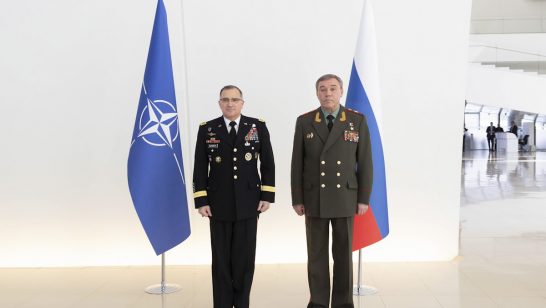
The NATO Summit in Wales was the latest in a series of summits involving Western leaders focused on addressing the consequences of recent Russian behaviour in Ukraine. It produced some notable achievements. Allies re-affirmed their commitment to collective defence. They provided a measure of re-assurance to eastern members of the alliance by agreeing a Readiness Action Plan that will establish a continuous rotation of air, land and maritime forces in Eastern Europe. And they agreed to increase NATO’s ability to move quickly in response to emerging threats by agreeing the creation of a Very High Readiness Joint Task Force (VJTF), some 4,000 to 6,000 troops strong, and capable of being deployed at two to five days’ notice. When seen alongside the commitment to increase the tempo of NATO exercises in Eastern Europe, this all amounts to a substantial advance in NATO readiness to face challenges coming from its east.
Despite the achievements, however, this NATO Summit, along with many others that have taken place among EU leaders in the recent past, left two major questions in the wider Western response to a changed strategic environment in Europe unanswered. These are first, what is the West’s overall strategy toward Russia? Second, how does the West, and especially Europe, intend to pay for the policies it needs to pursue to its east?
On the first question, it can be argued that the Wales Summit leaves the West’s strategy in relation to Russia shrouded in the same cloud of ambiguity and incoherence that has been present for some time.
The rhetoric coming out of the Summit was certainly clear, and tough. The Summit declaration referred explicitly to Russia’s ‘aggressive actions against Ukraine’. NATO’s formal position is that Russia must reverse its recent pattern of behaviour, hand Crimea back to the control of Kyiv, and stop destabilising the situation in the Donbass. If it does not do this, or if it further escalates its involvement in Ukraine, it will face further diplomatic isolation, increased economic sanctions and a growing NATO footprint and tempo of activities in Eastern Europe. So far, one might argue, so good.
The most important truth underpinning Western policy with regard to Russia confirmed at the Summit, however, was that NATO is unwilling to confront Russia militarily either in Ukraine or anywhere else in non-NATO Eastern Europe. Underpinning and explaining this truth is also a second of strategic significance, namely that Western interests in the region are deemed insufficiently core to warrant the taking of such a risky step against a nuclear armed opponent. This point about the limited nature of the interests perceived to be at stake by many Western leaders has also been brought into sharp relief by the protracted struggle involved in agreeing harsh sanctions on Russia, since it has been the desire not to harm even limited economic interests elsewhere in Europe that has been the sticking point.
This means the current approach is rhetorically confrontational, but not underwritten by a commitment to do what is necessary to succeed in the confrontation. It is an approach that holds out the prospect of some future improved relationship with Russia if Russian behaviour changes but appears incapable of applying sufficient economic or diplomatic pressure to change Russian action. And the alternative, which would be to seek some accommodation with Russia, is unattainable because it sees all of the compromises that might be required to get an accommodation as politically unpalatable and reminiscent of 1930s appeasement.
This no doubt all reflects internal divisions within the West over what to do, as well the complexity of the problem that Russian behaviour presents and the often fast moving nature of events on the ground. Nevertheless, the upshot is that NATO leaders left Wales with no strategy toward Russia worthy of the name.
With regard to the second question of how NATO intends to pay for the strategy it wishes to pursue in relation to Russia and Eastern Europe, assuming that the strategy can in time be clarified, the situation is no less worrisome.
Despite the welcome steps announced in Wales, the Summit failed to commit members to spend 2% of GDP on defence before 2020 and even by 2020 they have only committed to strive to meet that guideline, not to actually meet it. To the extent that this represents a spending commitment at all, in the 24 member states that do not currently meet the 2% target, this represents a decision by one group of leaders to commit their successors to something they are unwilling to commit to themselves. This is the clearest signal possible that, despite claims to the effect that recent events in Europe have been a game-changer, European leaders are in fact still unwilling to change the game and in reality do not perceive what has happened in Ukraine as sufficiently threatening to require them to do so with urgency.
This is all the more worrying because what underlies it appears to be the assumption that Putin either will not go any further or that if he does, then the US will continue to be the guarantor of Europe’s security. While it is true the US has huge economic and political interests in Europe that it is unlikely to abandon any time soon, this is a dangerous position for European leaders to put themselves in.
For one thing, it appears oblivious to the huge pressure on resources in Washington. President Obama has in the recent past said he will ensure that 60 percent of America’s military might is in the Pacific, that he will ramp up the fight against ISIL in Iraq and Syria, bolster NATO in Eastern Europe and do what is necessary to contain Putin’s Russia, all despite cuts on a significant scale to the US defence budget. It is unclear how the president intends to square this circle.
Also discounted in European thinking, apparently, is the possibility that the US could become embroiled in a major confrontation in the Asia-Pacific region that could see its military assets in Europe reduced out of necessity, not choice, leaving Europe exposed amid the sea of turbulence currently being experienced both to its east and south.
The alternative way out for Europeans if they are not willing to increase their overall defence spending, which is namely to get more bang for their current buck by radically increasing defence collaboration, was also not grasped convincingly in Wales, despite announcements of a number of cooperative initiatives under the Framework Nations Concept banner.
European leaders approach the end of 2014, in overall resource commitment terms, behaving as though nothing of significance has changed in the European security environment over the last 12 months.
While the NATO Summit produced a short-term show of support to allies in the east, therefore, it did nothing to suggest that NATO leaders intend to radically upgrade their deterrence and defence posture for the long-term or say anything that would indicate European and US leaders are willing, or know how, they are going to pay for it. At the same time, the Summit did nothing to indicate a European understanding of the profoundly changing pressures on the United States and what those pressures might mean for Europeans’ own need to take more responsibility for their own security. This has to be addressed through both increased defence budgets and more convincing defence cooperation among members of NATO soon. If not, there is an increased likelihood that real damage to NATO unity and to European security and economic interests will follow.
NATO officials and others worked incredibly hard in the run up to the Summit in Wales to deliver concrete outcomes that left the alliance stronger coming out of the meeting than going in. The outcomes achieved were welcome and worthwhile and those involved in delivering them deserve our thanks.
Ultimately however one is forced to conclude that the Summit was the latest in a long series of missed opportunities for Western leaders to confront and clarify their collective position with regard to the big strategic dilemmas and choices facing the West in its relations with Russia and the countries of non-NATO Eastern Europe. For that reason, the summit cannot be said to have laid the ground-work for a reconstituted Western strategy or even to have contributed to such ground-work. Those who say this was never a realistic prospect for the summit and therefore not its goal should perhaps reflect on the words of the late Italian writer and holocaust survivor, Primo Levi, who, in a different context asked: ‘If not now, when?
The opinions articulated above represent the views of the author(s), and do not necessarily reflect the position of the European Leadership Network or any of its members. The ELN’s aim is to encourage debates that will help develop Europe’s capacity to address the pressing foreign, defence, and security challenges of our time.


